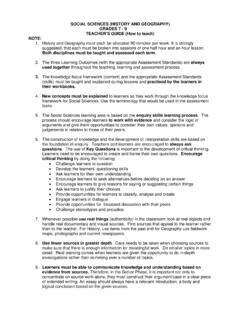Transcription of BUSINESS KEY CONCEPTS AND PRINCIPLES - FINAL 2
1 1 BUSINESS studies Key CONCEPTS and PRINCIPLES Grade 10 - 12 2 Table of Contents How to use this Guide .. 3 Definition of BUSINESS studies .. 4 BUSINESS studies four main topics .. 4 BUSINESS studies PRINCIPLES .. 4 BUSINESS Environment .. 8 Micro or Internal environment .. 9 Market or Task 12 Macro-environment .. 14 BUSINESS strategies .. 16 BUSINESS sector .. 19 Corporate social responsibility (CSR) .. 22 Contemporary socioeconomic issues .. 23 BUSINESS Ventures .. 25 BUSINESS idea .. 25 Entrepreneurship.
2 27 BUSINESS plan .. 28 Forms of Ownership .. 33 BUSINESS Role .. 41 BUSINESS ethics .. 41 Professionalism .. 41 Critical thinking .. 42 Team dynamics .. 42 Leadership .. 46 Problem-solving .. 48 Problem-solving techniques .. 48 BUSINESS Operations .. 52 General management .. 52 Human Resource function .. 58 Purchasing function .. 70 Production / Operations function .. 73 Financial 81 Marketing function .. 96 Administration and information systems .. 99 Public relations function .. 100 Total quality management (TQM).
3 101 3 Purpose of Study Guide The purpose of this Guide is to assist teachers and learners to manage BUSINESS studies CONCEPTS and PRINCIPLES . The Guide provides basic BUSINESS studies CONCEPTS as the first step towards introducing learners to the subject. The information contained in this document is intended to familiarise teachers and learners with BUSINESS studies CONCEPTS . This document is not intended to serve as a complete manual, but as a guide to assist teachers in coping with and managing the curriculum knowledge gap of learners.
4 It will form part of many other strategies and resources that will help learners to understand the subject. How to use this Guide This Guide should be used as a resource for teachers and learners, and learners should continually be referred to the Guide for clarity-seeking issues in the subject. The Guide should be used in conjunction with other resources. The CONCEPTS are set out according to main four BUSINESS studies topics and subtopics. 4 Definition of BUSINESS studies The subject BUSINESS studies deals with the knowledge, skills, attitudes and values critical for informed, productive, ethical and responsible participation in the formal and informal economic sectors.
5 The subject encompasses BUSINESS PRINCIPLES , theory and practice that underpin the development of entrepreneurial initiatives, sustainable enterprises and economic growth. BUSINESS studies four main topics 1. BUSINESS Environment 2. BUSINESS Venture 3. BUSINESS Roles 4. BUSINESS Operations BUSINESS studies PRINCIPLES BUSINESS studies PRINCIPLES are the essential, underlying factors that form the foundations of the subject. They focus on the theoretical and practical aspects of BUSINESS activities. The principle provides a framework for the study of BUSINESS studies .
6 The PRINCIPLES give coverage of the core PRINCIPLES of BUSINESS and management. They provide learners or aspiring managers with a clear and concise text that covers all aspects of the BUSINESS creation and management. It considers strategic implications of economic theories and PRINCIPLES on BUSINESS decisions and organisations. 1. The BUSINESS Environment Internal Micro Environment Market Environment External Macro Environment including Strategic planning 2. Organisational PRINCIPLES The Nature / form of BUSINESS Establishing a BUSINESS / Entrepreneurship BUSINESS sectors 3.
7 BUSINESS Functions For example o Marketing PRINCIPLES , 4 Ps / 7 Ps. 5 o Production PRINCIPLES , product planning and control. o Financial PRINCIPLES , capital requirement, etc. 4. PRINCIPLES of Management : Management PRINCIPLES are statements of fundamental truth. These PRINCIPLES serve as guidelines for decisions and actions of managers. They are derived through observation and analysis of events which managers have to face in practice. 1. Division of Work - The specialization of the workforce according to the skills a person , creating specific personal and professional development within the labour force and therefore increasing productivity; leads to specialization which increases the efficiency of labour.
8 2. Authority and Responsibility- The issue of commands followed by responsibility for their consequences. Authority means the right of a superior to give order to his subordinates; responsibility means obligation for performance. This principle suggests that there must be parity between authority and responsibility. They are co-existent and go together, and are two sides of the same coin. 3. Discipline- Discipline refers to obedience, proper conduct in relation to others, respect of authority, etc. It is essential for the smooth functioning of all organizations.
9 4. Unity of Command - This principle states that every subordinate should receive orders and be accountable to one and only one superior. If an employee receives orders from more than one superior, it is likely to create confusion and conflict. Unity of Command also makes it easier to fix responsibility for mistakes. 5. Unity of Direction - All those working in the same line of activity must understand and pursue the same objectives. All related activities should be put under one group, there should be one plan of action for them, and they should be under the control of one manager.
10 It seeks to ensure unity of action, focusing of efforts and coordination of strength. 6. Subordination of Individual Interest - The management must put aside personal considerations and put company objectives first. Therefore the interests of goals of the organization must prevail over the personal interests of individuals. 7. Remuneration - Workers must be paid sufficiently as this is a chief motivation of employees and therefore greatly influences productivity. 8. The Degree of Centralisation and Decentralisation - The amount of power wielded with the central management depends on company size.

















